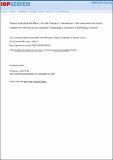Toward evaluating the effect of climate change on investments in the water resources sector: insights from the forecast and analysis of hydrological indicators in developing countries
Author(s)
Jacobsen, Michael; Boehlert, Brent; Neumann, James E.; Strzepek, Kenneth Marc
DownloadStrzepek-2013-Toward evaluating th.pdf (1.316Mb)
PUBLISHER_CC
Publisher with Creative Commons License
Creative Commons Attribution
Terms of use
Metadata
Show full item recordAbstract
The World Bank has recently developed a method to evaluate the effects of climate change on six hydrological indicators across 8951 basins of the world. The indicators are designed for decision-makers and stakeholders to consider climate risk when planning water resources and related infrastructure investments. Analysis of these hydrological indicators shows that, on average, mean annual runoff will decline in southern Europe; most of Africa; and in southern North America and most of Central and South America. Mean reference crop water deficit, on the other hand, combines temperature and precipitation and is anticipated to increase in nearly all locations globally due to rising global temperatures, with the most dramatic increases projected to occur in southern Europe, southeastern Asia, and parts of South America. These results suggest overall guidance on which regions to focus water infrastructure solutions that could address future runoff flow uncertainty. Most important, we find that uncertainty in projections of mean annual runoff and high runoff events is higher in poorer countries, and increases over time. Uncertainty increases over time for all income categories, but basins in the lower and lower-middle income categories are forecast to experience dramatically higher increases in uncertainty relative to those in the upper-middle and upper income categories. The enhanced understanding of the uncertainty of climate projections for the water sector that this work provides strongly support the adoption of rigorous approaches to infrastructure design under uncertainty, as well as design that incorporates a high degree of flexibility, in response to both risk of damage and opportunity to exploit water supply 'windfalls' that might result, but would require smart infrastructure investments to manage to the greatest benefit.
Date issued
2013-10Department
Massachusetts Institute of Technology. Center for Global Change Science; Massachusetts Institute of Technology. Joint Program on the Science & Policy of Global ChangeJournal
Environmental Research Letters
Publisher
IOP Publishing
Citation
Strzepek, Kenneth, Michael Jacobsen, Brent Boehlert, and James Neumann. “Toward Evaluating the Effect of Climate Change on Investments in the Water Resources Sector: Insights from the Forecast and Analysis of Hydrological Indicators in Developing Countries.” Environmental Research Letters 8, no. 4 (December 1, 2013): 044014. © 2013 IOP Publishing Ltd.
Version: Final published version
ISSN
1748-9326